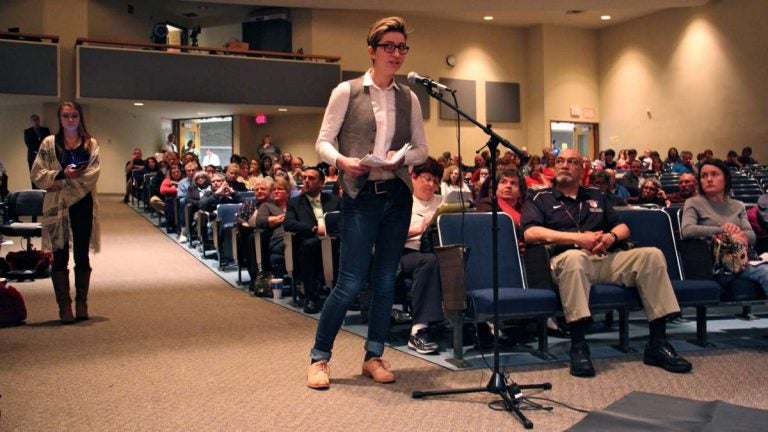Effort to block Boyertown school district’s transgender policy fails
Listen
Students testify in support of the Boyertown Area School District's policy of allowing transgender students to use locker rooms and restrooms that correspond to their gender identity. Four students sued the district, saying their privacy was violated when a transgender boy was allowed to use the same locker room. (Emma Lee/WHYY)
Just in time for the first day of school, a federal judge denied a conservative group’s attempt to temporarily block a Berks County school district’s transgender bathroom policy.
For a year, the Boyertown Area School District has allowed students to use the bathrooms and locker rooms corresponding to their gender identity.
The Alliance Defending Freedom sued the district earlier this year on behalf of four students who say the policy invades their privacy and amounts to sexual harassment.
The group wanted the policy reversed while its lawsuit moves forward, and the students needed to show they would suffer irreparable harm if an injunction were not granted.
On Friday, U.S. District Judge Edward G. Smith of the Eastern District of Pennsylvania ruled the group’s claims have no merit.
“The school district was trying its best last year to follow with what is believed to be the law by protecting all students, transgender” and those whose personal identity and gender corresponds with their birth sex, said attorney Michael Levin of the Levin Legal Group, representing the district and the administrators. “And the school district was very pleased that its actions were upheld by the court.
If the case moves forward, Levin said, attorneys will ask for a summary judgment — essentially asking for a dismissal that would favor the school district — based on the judge’s prior ruling.
While the school district’s lawyers say they’re pleased with the ruling, those on the other side are standing firm.
Jeremy Samek, one of the attorneys representing the plaintiffs, said Boyertown children deserve to be protected.
“I think that beliefs about gender shouldn’t be a license to violate privacy inside boys’ and girls’ locker rooms and restrooms because that really defeats the very purpose of sex-separated facilities in the first place,” he said.
Samek, senior counsel with the Independence Law Center in Harrisburg, said the judge’s ruling won’t change his argument.
For example, he said, a student who was born female, but identifies as male, should use the girls’ locker room.
“Our clients are completely comfortable with sharing a locker with somebody who’s the same [biological] sex as them, regardless of whether they’re transgender or not,” Samek said.
Mary Catherine Roper, deputy legal director for the ACLU, hailed the decision.
“If the judge had granted the preliminary injunction, it would have been the first court in the country to hold that students who are uncomfortable with transgender students have a right to exclude their fellow students from facilities that match their gender identity,” she said.
Roper represents Pennsylvania Youth Congress, a statewide organization that supports gay/straight alliances in high schools and colleges and individual LGBT students. The Boyertown Gay/Straight Alliance and trans students at Boyertown are members of the Youth Congress.
“Basically, what the judge has said is that non-transgender students don’t have a veto right over their fellow students’ education,” Roper said. “And that transgender boys are boys and transgender girls are girls, and they’re not trying to invade anybody’s rights. They’re just trying to live their lives.”
Though the judge initially agreed with their arguments on the preliminary injunction, Roper cautioned that he could change his mind.
“Really what they were relying on is an argument that being transgender doesn’t exist. And the judge didn’t agree, thank goodness,” she said. “I think, really, they just don’t believe that a person can be transgender.”
But Kellie Fiedorek, an attorney with the Alliance Defending Freedom, said it’s about respecting students’ privacy rights.
“People of opposite sexes shouldn’t be forced to shower and dress with members of the opposite sex,” she said. “Obviously, we sympathize with children who are working through difficult issues — including how they identify. And I think that the school can find win-win solutions that take into account their needs and what they’re experiencing while also protecting the right to privacy of everyone else.
“I think ultimately what the school policy should be is common sense and reasonable and protect every child — including trans — and not leaving any child’s rights or feelings behind,” Fiedorek said.
The plaintiffs now have 30 days to decide whether to appeal the ruling or move forward with the lawsuit.
WHYY is your source for fact-based, in-depth journalism and information. As a nonprofit organization, we rely on financial support from readers like you. Please give today.




